2024年中考英语语法-时态复习课件(共27张PPT)
文档属性
| 名称 | 2024年中考英语语法-时态复习课件(共27张PPT) |
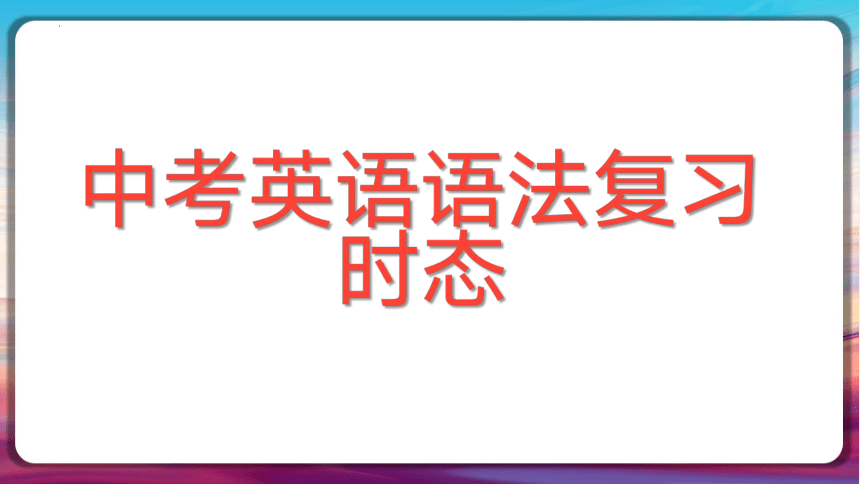
|
|
| 格式 | pptx | ||
| 文件大小 | 12.6MB | ||
| 资源类型 | 教案 | ||
| 版本资源 | 通用版 | ||
| 科目 | 英语 | ||
| 更新时间 | 2024-06-12 00:00:00 | ||
图片预览

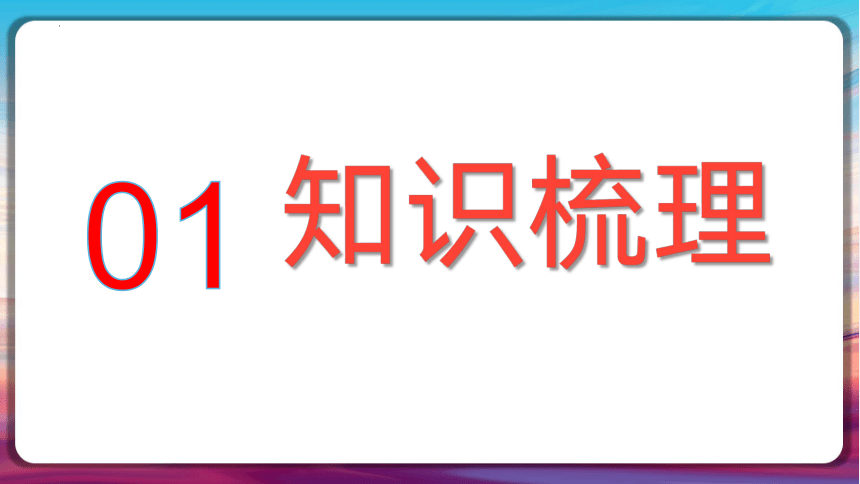
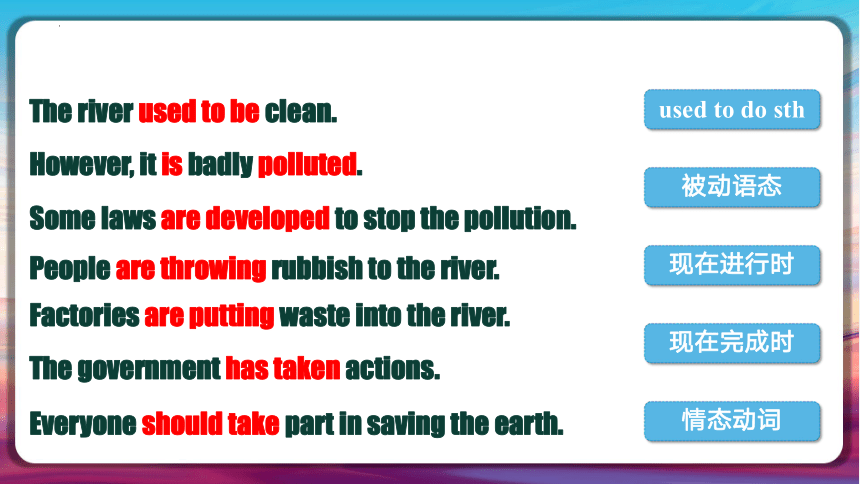
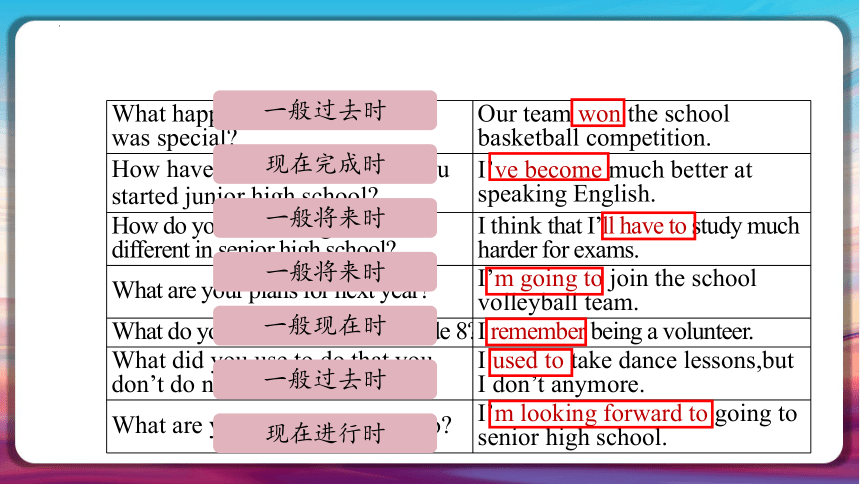

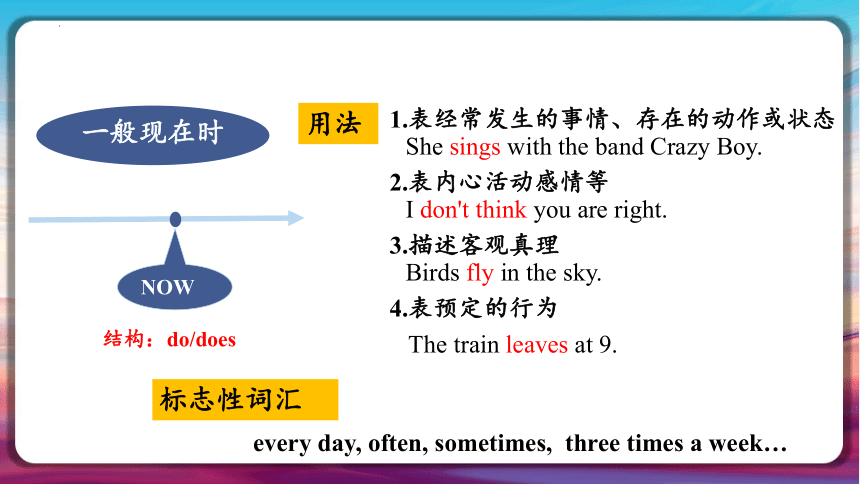
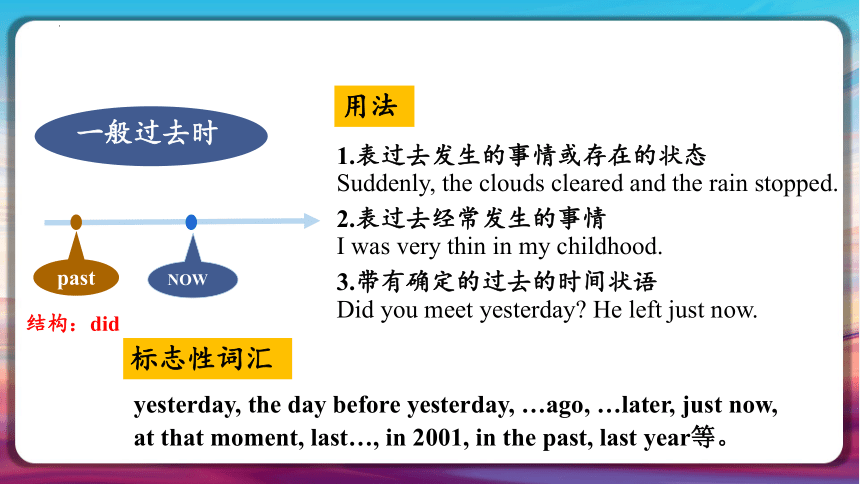
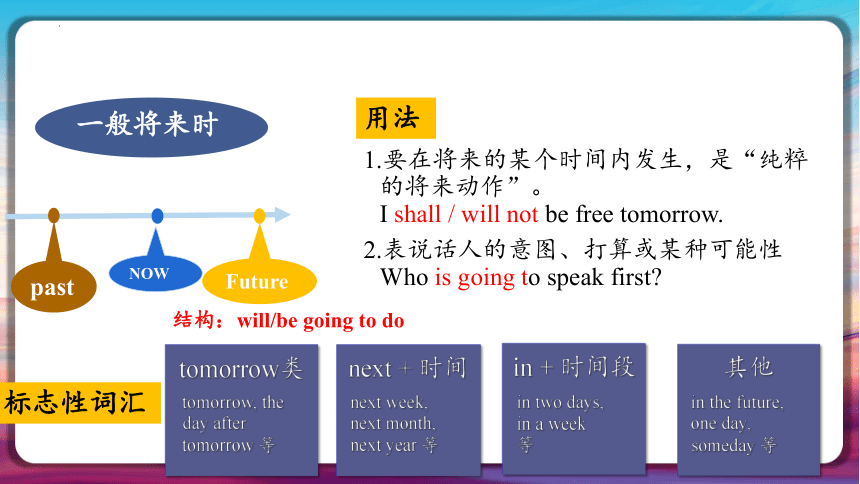
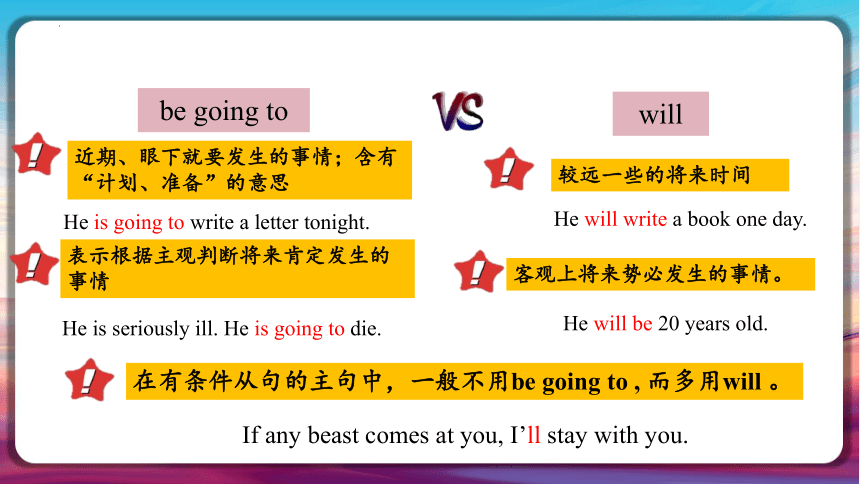
文档简介
(共27张PPT)
中考英语语法复习
时态
知识梳理
01
The river used to be clean.
However, it is badly polluted.
People are throwing rubbish to the river.
Factories are putting waste into the river.
The government has taken actions.
Some laws are developed to stop the pollution.
Everyone should take part in saving the earth.
used to do sth
被动语态
现在进行时
现在完成时
情态动词
What are your plans for next year I’m going to join the school volleyball team.
What do you remember about Grade 8 I remember being a volunteer.
What did you use to do that you don’t do now I used to take dance lessons,but I don’t anymore.
What are you looking forward to I’m looking forward to going to senior high school.
What happened in Grade 7 that was special Our team won the school basketball competition.
How have you changed since you started junior high school I’ve become much better at speaking English.
How do you think things will be different in senior high school I think that I’ll have to study much harder for exams.
一般过去时
现在完成时
一般将来时
一般将来时
一般现在时
一般过去时
现在进行时
NOW
TIME
will/shall + 实义动词原形/系表结构
be going to + 实义动词原形/系表结构
主语 + have / has + 过去分词 + …
1. was/were + 表语
2. 实义动词的过去式 + …
一般过去时
现在完成时
一般将来时
do/does
一般现在时
1.表经常发生的事情、存在的动作或状态
She sings with the band Crazy Boy.
2.表内心活动感情等
I don't think you are right.
3.描述客观真理
Birds fly in the sky.
4.表预定的行为
The train leaves at 9.
every day, often, sometimes, three times a week…
NOW
用法
标志性词汇
结构:do/does
1.表过去发生的事情或存在的状态
Suddenly, the clouds cleared and the rain stopped.
2.表过去经常发生的事情
I was very thin in my childhood.
3.带有确定的过去的时间状语
Did you meet yesterday He left just now.
一般过去时
yesterday, the day before yesterday, …ago, …later, just now,
at that moment, last…, in 2001, in the past, last year等。
NOW
past
用法
标志性词汇
结构:did
1.要在将来的某个时间内发生,是“纯粹的将来动作”。
I shall / will not be free tomorrow.
2.表说话人的意图、打算或某种可能性
Who is going to speak first
一般将来时
NOW
past
Future
tomorrow类
next + 时间
in + 时间段
其他
tomorrow, the day after tomorrow 等
next week, next month, next year 等
in the future, one day, someday 等
in two days,
in a week 等
用法
标志性词汇
结构:will/be going to do
will
be going to
近期、眼下就要发生的事情;含有“计划、准备”的意思
较远一些的将来时间
He is going to write a letter tonight.
表示根据主观判断将来肯定发生的事情
客观上将来势必发生的事情。
He is seriously ill. He is going to die.
在有条件从句的主句中,一般不用be going to , 而多用will 。
If any beast comes at you, I’ll stay with you.
He will write a book one day.
He will be 20 years old.
Some laws are developed to stop the pollution.
These trees were cut down by the workers last night.
In the future , more and more work will be done by the robots.
I think teenagers should be allowed to choose their own clothes.
被动语态
被动语态构成
be +过去分词
一般现在时被动语态
am/is/are +done
一般过去时被动语态
was/were+done
一般将来时被动语态
will be +done
有情态动词被动语态
情态动词 +done
Everyone should take part in saving the earth.
He can’t play the guitar.
They may have finished the task last month.
情态动词
1.情态动词+动词原形
2.情态动词没有人称和数的变化。
3. 常用的情态动词有:can/could, may/might,
must/have to,should/ought to, would,need 等。
People are throwing rubbish to the river.
Factories are putting waste into the river.
现在进行时
现在进行时结构
be(am,is,are)
现在进行时含义
①表示正在发生或者进行的动作。
②表示当前一段时间内的活动或现阶段正在进行的动作。
标志性词
now, right now,Look! Listen !
写出下面动词的现在分词。
1.make _______ 2.stop _______3.begin _______ 4.watch _______5.buy ________ 6.save _______7.put ________ 8.listen _______9.drive _______ 10.see _______
现在分词构成
1.一般情况下,直接+ing。
making
stopping
beginning
watching
buying
saving
putting
listening
driving
seeing
2.以不发音的e结尾的,去e再加+ing。
3.以重读闭音节结尾,且末尾只有一个辅 音字母的,双写这个辅音字母再加+ing。
现在分词
写出下面动词的过去分词。
1.clean _______ 2.live _______3.study _______ 4.plan _______5.put ________ 6.begin _______7.teach________ 8.get _______9.drive _______ 10.see _______
cleaned
lived
studied
planned
put
begun
taught
got
driven
seen
过去分词的规则变化
1.一般情况下,直接+ed。
2.以字母e结尾的,直接+d。
4.以重读闭音节结尾,且末尾只有一个辅音字母的, 双写这个辅音字母再加+ed。
3.以辅音字母+y结尾的,将y改为i再加+ed。
过去分词
不规则动词的过去分词(详情见书后附录)
原形 过去式 过去分词
AAA型 put put put
AAB型 beat beat beaten
ABA型 become became become
ABB型 get got got
ABC型 begin began begun
1.In the past few years, great changes__________ (take) place in Lianyungang.
2.I ___________ (not read) the book Little Women yet, but I'll let you read it first.
3.He ____________(not come) yet. What do you think has happened to him
4.They __________________ (marry) for fifty years.
5.Linda_____________(live) here since she was five years old.
has taken
haven’t read
hasn’t come
have been married
has lived
for+一段时间
since+过去时间点/从句(一般过去时)
1.表示截止 已完成的动作
By now, I have collected all the data that I need.
2.表示发生在 而对 产生影响、带来结果的动作
She has been to the United States.
3.表示过去发生的动作 到现在,并可能还要 .
I have learned English for 8 years.
NOW
past
现在完成时
结构:have/has +done
用法
for + 时间段 / since + 过去时间点(从句);
already / yet / ever / never / just / recently / lately /so far / in the past few years
标志性词汇
目前
过去
现在
持续
延续下去
注意:在现在完成时态中,和表示一段时间的状语(for, since, how long)连用的动词必须是延续性动词。
He has died for three years.
He has been dead for three years.
True/False
1.基本结构: be+及物动词的过去分词
2.定义:被动语态表示主语为谓语动词动作的承受者。
3.几种常用时态的被动语态的结构:
一般现在时 am/is/are+及物动词的过去分词
一般过去时 was/were+及物动词的过去分词
一般将来时 will/shall be+及物动词的过去分词
被动语态 的用法
情态动词 的用法
1.情态动词+动词原形
2.情态动词没有人称和数的变化。
3.常用的情态动词有:can/could, may/might,
must/have to,should/ought to, would,need 等。
模拟练习
02
— We ________ very simply and do not spend much money on food.
— That’s why you’re called the Greens.
A. had eaten
B. ate
C. will eat
D. eat
Practice
A. plant
B. will plant
C. are planting
D. planted
Practice
My parents and I ________ trees last Sunday.
A. arrives
B. arrived
C. will arrive
D. has arrived
Practice
— Is Helen here
— No, she isn’t here. She ________ in half an hour.
A. left
B. went away from
C. have been away from
D. have left
Practice
I ______ my hometown for a long time. I really miss it!
用括号内所给动词的适当形式填空。
1. The Secondary School Entrance Exam _______ (hold) in June.
2. A strange noise __________ (hear) by his mother last night.
3. A wide road _____________ (build) between the two villages by those people next year.
4.Actions should______________(take) to protect the earth.
is held
was heard
will be built
be taken
一般现在时
一般过去时
一般将来时
情态动词
thanks
中考英语语法复习
时态
知识梳理
01
The river used to be clean.
However, it is badly polluted.
People are throwing rubbish to the river.
Factories are putting waste into the river.
The government has taken actions.
Some laws are developed to stop the pollution.
Everyone should take part in saving the earth.
used to do sth
被动语态
现在进行时
现在完成时
情态动词
What are your plans for next year I’m going to join the school volleyball team.
What do you remember about Grade 8 I remember being a volunteer.
What did you use to do that you don’t do now I used to take dance lessons,but I don’t anymore.
What are you looking forward to I’m looking forward to going to senior high school.
What happened in Grade 7 that was special Our team won the school basketball competition.
How have you changed since you started junior high school I’ve become much better at speaking English.
How do you think things will be different in senior high school I think that I’ll have to study much harder for exams.
一般过去时
现在完成时
一般将来时
一般将来时
一般现在时
一般过去时
现在进行时
NOW
TIME
will/shall + 实义动词原形/系表结构
be going to + 实义动词原形/系表结构
主语 + have / has + 过去分词 + …
1. was/were + 表语
2. 实义动词的过去式 + …
一般过去时
现在完成时
一般将来时
do/does
一般现在时
1.表经常发生的事情、存在的动作或状态
She sings with the band Crazy Boy.
2.表内心活动感情等
I don't think you are right.
3.描述客观真理
Birds fly in the sky.
4.表预定的行为
The train leaves at 9.
every day, often, sometimes, three times a week…
NOW
用法
标志性词汇
结构:do/does
1.表过去发生的事情或存在的状态
Suddenly, the clouds cleared and the rain stopped.
2.表过去经常发生的事情
I was very thin in my childhood.
3.带有确定的过去的时间状语
Did you meet yesterday He left just now.
一般过去时
yesterday, the day before yesterday, …ago, …later, just now,
at that moment, last…, in 2001, in the past, last year等。
NOW
past
用法
标志性词汇
结构:did
1.要在将来的某个时间内发生,是“纯粹的将来动作”。
I shall / will not be free tomorrow.
2.表说话人的意图、打算或某种可能性
Who is going to speak first
一般将来时
NOW
past
Future
tomorrow类
next + 时间
in + 时间段
其他
tomorrow, the day after tomorrow 等
next week, next month, next year 等
in the future, one day, someday 等
in two days,
in a week 等
用法
标志性词汇
结构:will/be going to do
will
be going to
近期、眼下就要发生的事情;含有“计划、准备”的意思
较远一些的将来时间
He is going to write a letter tonight.
表示根据主观判断将来肯定发生的事情
客观上将来势必发生的事情。
He is seriously ill. He is going to die.
在有条件从句的主句中,一般不用be going to , 而多用will 。
If any beast comes at you, I’ll stay with you.
He will write a book one day.
He will be 20 years old.
Some laws are developed to stop the pollution.
These trees were cut down by the workers last night.
In the future , more and more work will be done by the robots.
I think teenagers should be allowed to choose their own clothes.
被动语态
被动语态构成
be +过去分词
一般现在时被动语态
am/is/are +done
一般过去时被动语态
was/were+done
一般将来时被动语态
will be +done
有情态动词被动语态
情态动词 +done
Everyone should take part in saving the earth.
He can’t play the guitar.
They may have finished the task last month.
情态动词
1.情态动词+动词原形
2.情态动词没有人称和数的变化。
3. 常用的情态动词有:can/could, may/might,
must/have to,should/ought to, would,need 等。
People are throwing rubbish to the river.
Factories are putting waste into the river.
现在进行时
现在进行时结构
be(am,is,are)
现在进行时含义
①表示正在发生或者进行的动作。
②表示当前一段时间内的活动或现阶段正在进行的动作。
标志性词
now, right now,Look! Listen !
写出下面动词的现在分词。
1.make _______ 2.stop _______3.begin _______ 4.watch _______5.buy ________ 6.save _______7.put ________ 8.listen _______9.drive _______ 10.see _______
现在分词构成
1.一般情况下,直接+ing。
making
stopping
beginning
watching
buying
saving
putting
listening
driving
seeing
2.以不发音的e结尾的,去e再加+ing。
3.以重读闭音节结尾,且末尾只有一个辅 音字母的,双写这个辅音字母再加+ing。
现在分词
写出下面动词的过去分词。
1.clean _______ 2.live _______3.study _______ 4.plan _______5.put ________ 6.begin _______7.teach________ 8.get _______9.drive _______ 10.see _______
cleaned
lived
studied
planned
put
begun
taught
got
driven
seen
过去分词的规则变化
1.一般情况下,直接+ed。
2.以字母e结尾的,直接+d。
4.以重读闭音节结尾,且末尾只有一个辅音字母的, 双写这个辅音字母再加+ed。
3.以辅音字母+y结尾的,将y改为i再加+ed。
过去分词
不规则动词的过去分词(详情见书后附录)
原形 过去式 过去分词
AAA型 put put put
AAB型 beat beat beaten
ABA型 become became become
ABB型 get got got
ABC型 begin began begun
1.In the past few years, great changes__________ (take) place in Lianyungang.
2.I ___________ (not read) the book Little Women yet, but I'll let you read it first.
3.He ____________(not come) yet. What do you think has happened to him
4.They __________________ (marry) for fifty years.
5.Linda_____________(live) here since she was five years old.
has taken
haven’t read
hasn’t come
have been married
has lived
for+一段时间
since+过去时间点/从句(一般过去时)
1.表示截止 已完成的动作
By now, I have collected all the data that I need.
2.表示发生在 而对 产生影响、带来结果的动作
She has been to the United States.
3.表示过去发生的动作 到现在,并可能还要 .
I have learned English for 8 years.
NOW
past
现在完成时
结构:have/has +done
用法
for + 时间段 / since + 过去时间点(从句);
already / yet / ever / never / just / recently / lately /so far / in the past few years
标志性词汇
目前
过去
现在
持续
延续下去
注意:在现在完成时态中,和表示一段时间的状语(for, since, how long)连用的动词必须是延续性动词。
He has died for three years.
He has been dead for three years.
True/False
1.基本结构: be+及物动词的过去分词
2.定义:被动语态表示主语为谓语动词动作的承受者。
3.几种常用时态的被动语态的结构:
一般现在时 am/is/are+及物动词的过去分词
一般过去时 was/were+及物动词的过去分词
一般将来时 will/shall be+及物动词的过去分词
被动语态 的用法
情态动词 的用法
1.情态动词+动词原形
2.情态动词没有人称和数的变化。
3.常用的情态动词有:can/could, may/might,
must/have to,should/ought to, would,need 等。
模拟练习
02
— We ________ very simply and do not spend much money on food.
— That’s why you’re called the Greens.
A. had eaten
B. ate
C. will eat
D. eat
Practice
A. plant
B. will plant
C. are planting
D. planted
Practice
My parents and I ________ trees last Sunday.
A. arrives
B. arrived
C. will arrive
D. has arrived
Practice
— Is Helen here
— No, she isn’t here. She ________ in half an hour.
A. left
B. went away from
C. have been away from
D. have left
Practice
I ______ my hometown for a long time. I really miss it!
用括号内所给动词的适当形式填空。
1. The Secondary School Entrance Exam _______ (hold) in June.
2. A strange noise __________ (hear) by his mother last night.
3. A wide road _____________ (build) between the two villages by those people next year.
4.Actions should______________(take) to protect the earth.
is held
was heard
will be built
be taken
一般现在时
一般过去时
一般将来时
情态动词
thanks
同课章节目录
- 词法
- 名词
- 动词和动词短语
- 动词语态
- 动词时态
- 助动词和情态动词
- 非谓语动词
- 冠词
- 代词
- 数词和量词
- 形容词副词及其比较等级
- 介词和介词短语
- 连词和感叹词
- 构词法
- 相似、相近词比较
- 句法
- 陈述句
- 一般疑问句和否定疑问句
- 特殊疑问句及选择疑问句
- 反意疑问句
- 存在句(There be句型)
- 宾语从句
- 定语从句
- 状语从句
- 主谓一致问题
- 简单句
- 并列句
- 复合句
- 主谓一致
- 主、表语从句
- 名词性从句
- 直接引语和间接引语
- 虚拟语气
- 感叹句
- 强调句
- 倒装句
- 祈使句
- 句子的成分
- 句子的分类
- 题型专区
- 单项选择部分
- 易错题
- 完形填空
- 阅读理解
- 词汇练习
- 听说训练
- 句型转换
- 补全对话
- 短文改错
- 翻译
- 书面表达
- 任务型阅读
- 语法填空
- 其他资料
